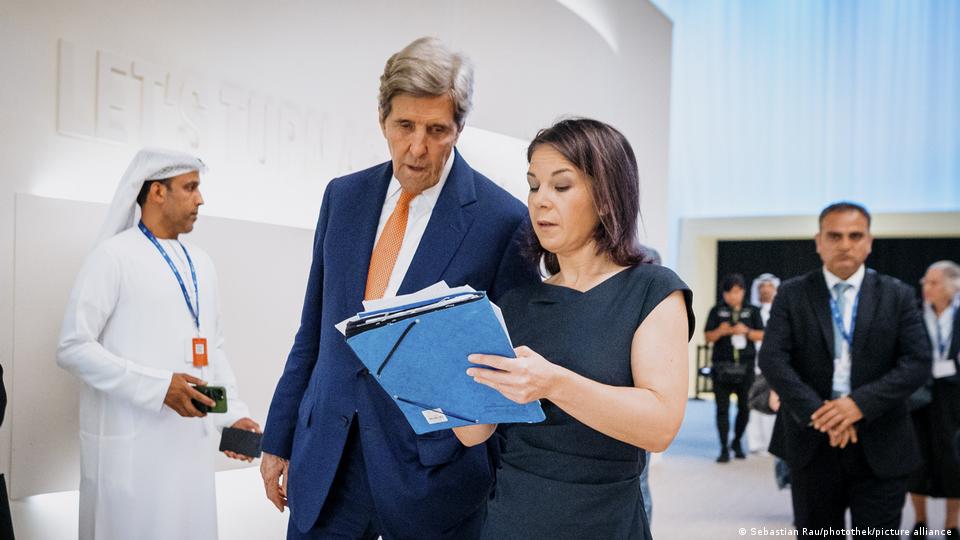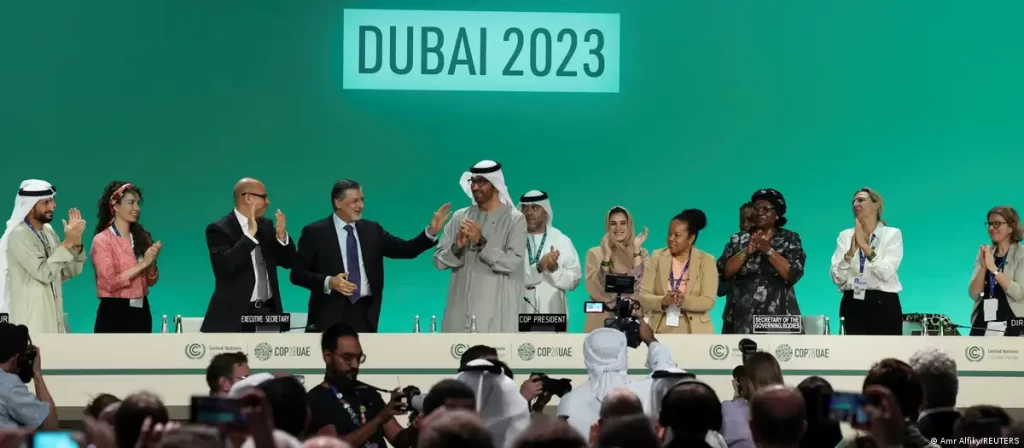What have the Dubai climate talks achieved?
After a year of record-high temperatures and increasing greenhouse gas emissions, global leaders at the COP28 climate have agreed to “transition away” from fossil fuels for the first time.
The landmark first was laid out in a text designed to respond to the failure so far to meet a previous goal of limiting global warming to 1.5 degrees Celsius from preindustrial levels.
The decision, agreed by almost 200 countries, has been hailed as marking the beginning of the end of the fossil fuel era.
However, the agreed text did not call for an outright phasing out of oil, gas and coal. As a result, it leaves “a lot of room for interpretation, according to UN climate chief Simon Stiell.
Stiell warned that “loopholes leave us vulnerable to fossil fuel vested interests, which could crash our ability to protect people everywhere against rising climate impacts.”
Read DW’s Martin Kuebler and Tim Schauenberg’s full report here.
UN chief says era of fossil fuels must end
United Nations Secretary-General Antonio Guterres has welcomed the COP28 announcement and highlighted the need for solutions to be fair.
In a statement, Guterres said that “for the first time, the outcome recognizes the need to transition away from fossil fuels.”
“The era of fossil fuels must end — and it must end with justice and equity,” he said.
United Nations Climate Secretary Simon Stiell told delegates their efforts were needed to signal a hard stop to humanity’s core climate problem.
“Whilst we didn’t turn the page on the fossil fuel era in Dubai, this outcome is the beginning of the end.”
Stiell warned delegates that what they adopted was a “climate action lifeline, not a finish line.”
US climate envoy Kerry hails cooperation in troubled times
The United States special envoy to the COP28 climate summit said the resolutions show what can be achieved, even at a difficult time for the world.
“I am in awe of the spirit of cooperation that has brought everybody together,” John Kerry said, adding that the outcome showed multilateralism could still work despite wars in Ukraine and the Middle East.
“This document sends very strong messages to the world,” said Kerry, a former US secretary of state.

German Foreign Minister Annalena Baerbock with US climate envoy John Kerry – Image: Sebastian Rau/photothek/picture alliance
‘Great joy’ from German foreign minister
Germany’s government has lent its express backing to the agreement in Dubai to move away from fossil fuels.
Sources in the German delegation told the German news agency DPA that the resolution was “a huge load off” of German Foreign Minister Annalena Baerbock‘s mind.
For the first time at a UN climate conference, the global community is calling for an end to fossil fuels.
“Great joy in the German delegation and from the foreign minister that the world has decided to end the fossil age,” DPA heard.
More than 100 countries, including Germany, had called for a deadline to phase out fossil fuels like oil, gas and coal, but this was not included in the final text adopted in Dubai.
German environment minister says formulation could have been stronger
German Environment Minister Svenja Schulze has said the deals reached at the COP28 climate conference were a “decent result.”
“It’s a good signal in today’s times the world is able to come to an agreement, said Schulze on the sidelines of the global refugee forum in Geneva.
“From the German side we would have desired a much stronger formulation for moving away from fossil fuels,” Schulze said, adding that she understood that many countries found the transition challenging.
The minister welcomed that, for the first time, an “exit” from coal, oil and gas was included in the final document of a climate conference.
EU chief says deal heralds new era
European Commisson President Ursula von der Leyen has hailed the deal struck at the COP28 climate summit as the dawn of a new world with no need for coal or oil.
“Today’s agreement marks the beginning of the post-fossil era,” von der Leyen tweeted.
“A crucial part of this historic deal is truly made in Europe. The whole world endorsed our 2030 targets: to triple renewable energy and to double energy efficiency, both by 2030.”
The European Union’s commissioner for climate action also praised the resolutions reached.
It was “a day to salute the fact that humanity has finally done what is long, long overdue,” Wopke Hoekstra, who served as the EU’s chief negotiator, told the plenary session of the conference in Dubai.
Marshall Islands delegate says statement is ‘full of holes’
The Marshall Islands‘ head of delegation, John Silk, used a canoe analogy to lament statement as falling far short.
“I came here from my home in the islands to work with you all to solve the greatest challenge of our generation.”
“I came here to build a canoe together for my country. Instead, we have built a canoe with a weak and leaky hull, full of holes. Instead, we have put it in the water.”
The negotiator had warned that an earlier draft marked a “death warrant” for his nation, which is just 2.1 meters (7 feet) above sea level.
Pacific campaigner complains no time to voice objections
Pacific climate campaigner Joseph Sikulu said the statement was gaveled through without giving time for objections on purpose.
“People weren’t given an opportunity to be able to express their objections,” Sikulu, from the Pacific Cooperation Foundation, said.
“The text, as it is now, is still a death sentence for the Pacific. We can celebrate the small incremental changes, but there is not enough done in there to adjust the root cause of the climate crisis, which is the extraction of fossil fuels.”
Samoa delegate says deal is not enough, draws applause
Samoa’s chief negotiator says small island states are concerned about several aspects of the Dubai climate deal, prompting applause from a number of delegates at the COP28 climate summit.
“We didn’t want to interrupt the standing ovation when we came into the room, but we are a little confused about what happened,” said negotiator Anne Rasmussen, whose country is chair of the Alliance of Small Island States. “It seems that you just get on with the decisions and the small island developing states were not in the room.”
“We have made an incremental advancement over business as usual when what we really needed is an exponential step change in our actions.”
China says responsibility is on developed countries
China has said developed countries need to “take the lead” in the energy transition, delivering financial support to developing nations “without delay.”
“Developed countries have an unshakable, historical responsibility for climate change and therefore must take the lead to embark on the 1.5 degree Celsius pathway ahead of the rest of the world,” Zhao Yingmin, China’s vice environment minister, told the COP28 conference in Dubai.
Saudi Arabia pleased with COP28 outcome
One of the world’s leading oil producers, Saudi Arabia, has praised the outcome of the UN climate summit as a “great success.”
The agreement saw nations adopt a call for the transition away from fossil fuels, but it stopped short of stipulating a phase-out.
“On behalf of the Arab Group, I express our gratitude to the efforts of all the state parties in order to have a successful first global stocktake,” Saudi official Albara Tawfiq told the COP28 conference.
Climate group hopeful COP28 president can use influence
The campaign manager of the climate group Oil Change International says he hopes COP28 President Sultan al-Jaber’s role as the CEO of the United Arab Emirates’ national oil company ADNOC will ensure there are no new fossil fuel projects as a result of the deal.
Romain Loualalen said his organization was “really looking forward to seeing ADNOC, the national oil company of the UAE, actually implement the ‘UAE Consensus’ and move away from fossil fuels, which means not approving any new oil and gas projects and transitioning to renewable energy.”
“Obviously, the COP 28 president, as the CEO of ADNOC, will sure implement that agreement.” (DW/NN-13-12-23)






